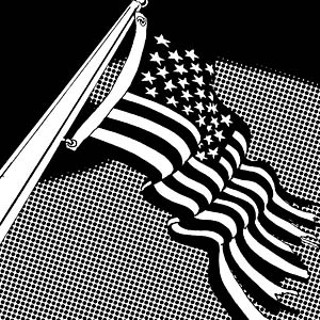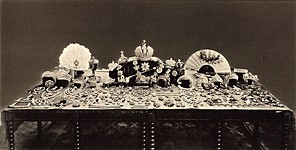Letters at 3AM
Issues '08: Russia
By Michael Ventura, Fri., Aug. 29, 2008

Once upon a time there was a Russian named Mikhail Khodorkovsky. Was he a gangster? Some say no, some say yes, and some say, "Sometimes." Was he a democratic visionary? "Yes!" chants America's press; others are not so sure. But all agree that by 2003 he was Russia's richest person, the 16th richest man in the world according to Wikipedia, owner of that great and powerful Russian enterprise Yukos Oil Co. Then came Oct. 25, 2003 – a day sad for some, joyful for others, but a historical turning point for all: Vladimir Putin, president (now prime minister) of Russia, whose soul George W. Bush claims not only to have seen but to have approved, ordered the arrest of Khodorkovsky.
The West was shocked, shocked, do you hear?! Arrest the 16th richest man in the world?! That could never happen in a free country! The charges must be false! Well, we'll likely never know whether the charges were false, half-false, or one-sixteenth false. We'll likely never know whether the trial was even one-sixteenth fair. But off to jail went Khodorkovsky, and in jail Khodorkovsky remains. The Western press, as with one voice, declaimed that Putin is but a czar in blue jeans (true, he often wears blue jeans); as for Khodorkovsky, they say he was framed for his love of free markets, truth, democracy, and, you know, that stuff.
Oh, there was one article, just one, to my knowledge, that clued us in as to why a czar in blue jeans might, just might, want to deal harshly with Mikhail Khodorkovsky. The article appeared on p.1 of The New York Times on Nov. 5, 2003, though its columnists never refer to it. It tells an interesting tale. Khodorkovsky "spent heavily in Washington to court the Capitol's inner circle"; he even met with U.S. "Energy Secretary Spencer Abraham to discuss America's oil policy." The Carlyle Group, an investment bank, had "a close business relationship" with Khodorkovsky; in fact, former President George H.W. Bush was on retainer to Carlyle when he spoke at a dinner in Moscow attended by Khodorkovsky a month before the arrest, though Carlyle claims "his visit had nothing to do with oil deals." Months before his arrest, Khodorkovsky was a guest of former Sen. Bill Bradley at an Idaho gabfest attended by the likes of Warren Buffett and Bill Gates (The New York Times, Nov. 10, 2003, p.1). The Nov. 5 article noted that Bradley advised the Open Russia Foundation, which was bankrolled by Khodorkovsky, and guess who is on its board? Henry Kissinger. Also, Khodorkovsky donated $500,000 to the Carnegie Endowment for International Peace, "a think tank that is home to some of the most often quoted analysts of Russian affairs." "People close to him said that [Khodorkovsky's goal was the] refashioning of operations and perceptions of Yukos Oil in preparation for a merger with a Western company," identified the following year as Exxon Mobil Corp. (The New York Times, June 20, 2004, p.BU1). Khodorkovsky even installed an American as Yukos Oil's chief executive officer and another as its chief financial officer. (They fled Russia later, reported The New York Times online, Nov. 25, 2004.)
Why do I go on and on about Khodorkovsky?
First, a disclaimer: I fully realize that in Putin's Russia, a journalist like myself would, at best, be out of a job; at worst, I'd be a ripening corpse in a Moscow alley. But it's also true that if I were a Russian, I would not appreciate – in fact, I'd be downright aggravated by – Mikhail Khodorkovsky selling Russia's best chance of solvency and sovereignty, its largest oil company, to ExxonMobil. It seems many Russians felt the same. A month after Khodorkovsky's arrest, the popularity rating of Vladimir Putin shot from 73% to 82% (The New York Times online, Nov. 19, 2003).
With the arrest of Khodorkovsky, Putin served notice on Russia's capitalists, saying, in effect: "Make all the millions you can, so long as Russia's resources stay Russian." They took heed, and in just five years Russia has gone from a crippled to a powerful nation. By hook or by crook, for good or for ill, Putin did not allow what America's Presidents George H.W. Bush, Bill Clinton, and George W. Bush not only allowed but abetted under the banner of "globalization": the massive reallocation overseas of America's resources and industry for the profit of the very few.
Secure in the knowledge that Russian capitalists had gotten the message and imitating the Chinese model of what might be called "national capitalism," Russia under Putin swiftly became what it had not been since the fall of the Soviet Union: a major player. Putin's opening salvo, not two months after Khodorkovsky's arrest, was aimed straight at the U.S., as seen in this article from The New York Times online, Dec. 23, 2003: "For Oil Contracts, Russia Will Waive Most of Iraq's $8 Billion Debt." Said Iraq's "American-backed" Governing Council, "we will be open to all Russian companies."
We've since seen a steady stream of such headlines. "China and Japan Jockey for Share of Russian Gas" (The New York Times, Nov. 3, 2004, p.W1). "Russia Bars Foreign Bidders From Big Mineral Auctions ... only companies with at least 51 percent Russian ownership [are] allowed to bid" (The New York Times online, Feb. 11, 2005). "Russia Denies War Games With China Are a Signal to Taiwan" (The New York Times, March 19, 2005, p.5). "Russia surpassed the United States in 2005 as the leader in weapons deals with the developing world, and its new agreements included selling $700 million in surface-to-air missiles to Iran" (The New York Times, Oct. 29, 2006, p.12). "Russia ... agreed to ship nuclear fuel to Iran to power a reactor it has been helping to build" (The Week, Oct. 6, 2006, p.9). "New India Accords With Russia Include More Nuclear Power Plants"; India's Prime Minister Manmohan Singh said, "Russia remains indispensable to India's strategic interests" (The New York Times, Jan. 26, 2007, p.10). "Russian President Vladimir Putin voiced support for the formation of a natural-gas cartel. The idea was first raised by Iran. Russia, Iran and Qatar are the top gas exporters, together controlling nearly two-thirds of the world's natural gas reserves" (The Week, Feb. 23, 2007, p.9). Putin "brokered an agreement ... with [Turkmenistan and Kazakhstan] to build a new gas pipeline to Russia, delivering a major setback to continuing American efforts to send Central Asian gas exports directly to Europe" (The New York Times, May 13, 2007, p.14). Added The Economist, May 19, 2007, p.12: "A troubling new pipeline deal is a symbol of the West's inability to cope with Russia." Putin "has embarked on a $200 billion rearmament program" (The Week, Dec. 21, 2007, p.11). "Pipeline Cements Russia's Hold on Europe's Gas Supply" (The New York Times, Jan. 19, p.5). "[W]ith the largest per capita currency reserves in the world while paying down nearly all sovereign debt ... Russia stands out as potentially least susceptible to an American recession" (The New York Times online, Jan. 25).
On Aug. 7, Georgia recklessly attacked its breakaway province, South Ossetia; in response, Russia attacked Georgia. I've not space to pick through the misinformation spouting from all sides, but some facts are incontestable: Justified or not, Russia attacked a country often described as "a staunch U.S. ally," home to a U.S.-backed oil pipeline – but America's resources are so depleted, its military so overextended, its economic stature so diminished, that the U.S. could respond only with words. "American and European leaders were demanding, begging and pleading with Russia" (The New York Times, Aug. 12, p.1). France, Germany, and Italy refused to take sides (The Guardian online, Aug. 16). "We must not threaten [Russia]," said French Foreign Minister Bernard Kouchner, "because it will not work. Because everyone knows we are not going to war" (The New York Times, Aug. 20, p.10). On Aug. 18 the Associated Press (online) reported inconclusive crisis meetings between U.S. Secretary of State Condoleezza Rice and the European Union. The report's conclusion told the whole story and marks a sea change in geopolitics: "Russia is the EU's largest energy supplier."
America's force and prestige proved too weak to protect an American ally. Needing Russian energy more than American commerce, Europe would not fall in with American policy. So you tell me: Is the United States still a superpower in anyone's eyes but our own?










